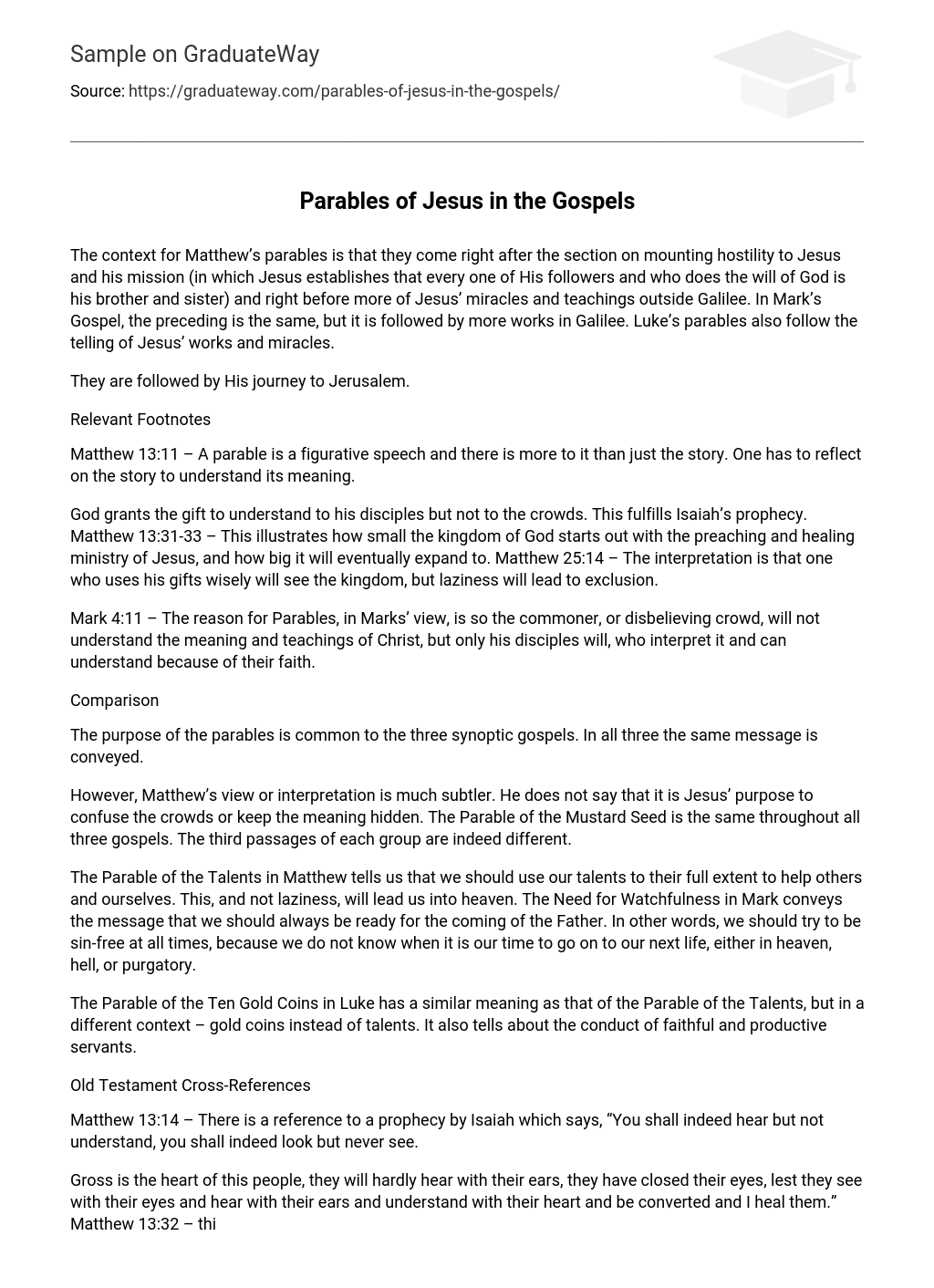The context for Matthew’s parables is that they come right after the section on mounting hostility to Jesus and his mission (in which Jesus establishes that every one of His followers and who does the will of God is his brother and sister) and right before more of Jesus’ miracles and teachings outside Galilee. In Mark’s Gospel, the preceding is the same, but it is followed by more works in Galilee. Luke’s parables also follow the telling of Jesus’ works and miracles.
They are followed by His journey to Jerusalem.
Relevant Footnotes
Matthew 13:11 – A parable is a figurative speech and there is more to it than just the story. One has to reflect on the story to understand its meaning.
God grants the gift to understand to his disciples but not to the crowds. This fulfills Isaiah’s prophecy. Matthew 13:31-33 – This illustrates how small the kingdom of God starts out with the preaching and healing ministry of Jesus, and how big it will eventually expand to. Matthew 25:14 – The interpretation is that one who uses his gifts wisely will see the kingdom, but laziness will lead to exclusion.
Mark 4:11 – The reason for Parables, in Marks’ view, is so the commoner, or disbelieving crowd, will not understand the meaning and teachings of Christ, but only his disciples will, who interpret it and can understand because of their faith.
Comparison
The purpose of the parables is common to the three synoptic gospels. In all three the same message is conveyed.
However, Matthew’s view or interpretation is much subtler. He does not say that it is Jesus’ purpose to confuse the crowds or keep the meaning hidden. The Parable of the Mustard Seed is the same throughout all three gospels. The third passages of each group are indeed different.
The Parable of the Talents in Matthew tells us that we should use our talents to their full extent to help others and ourselves. This, and not laziness, will lead us into heaven. The Need for Watchfulness in Mark conveys the message that we should always be ready for the coming of the Father. In other words, we should try to be sin-free at all times, because we do not know when it is our time to go on to our next life, either in heaven, hell, or purgatory.
The Parable of the Ten Gold Coins in Luke has a similar meaning as that of the Parable of the Talents, but in a different context – gold coins instead of talents. It also tells about the conduct of faithful and productive servants.
Old Testament Cross-References
Matthew 13:14 – There is a reference to a prophecy by Isaiah which says, “You shall indeed hear but not understand, you shall indeed look but never see.
Gross is the heart of this people, they will hardly hear with their ears, they have closed their eyes, lest they see with their eyes and hear with their ears and understand with their heart and be converted and I heal them.” Matthew 13:32 – this can be traced back to Ezekiel 17:23 which says basically the same thing, “on the mountain heights of Israel I will plant it. It shall put forth branches and bear fruit, and become a majestic cedar. Birds of every kind shall dwell beneath it, every winged thing in the shade of its boughs.
” A tree of the Lord will represent a dwelling for His people. Mark 4:12 and Luke 8:9 have the same reference as Matthew to Isaiah. Luke also has the same reference to Ezekiel as Matthew. The rest of the passages have no Old Testament cross-references.
Commentary
Meaning of Parables — Barclay says that for the meaning for the parables, that the Greek word for secret is mustered. This originally meant to the New Testament society, “something which was unintelligible to the outsider but crystal clear to the man who had been initiated” (Barclay). In other words, Christianity can only be understood from the inside, through personal experience.
So Jesus spoke in parables because common, outsider, men could not see the truth in any other way. This was a deliberate act of God. There was great despair felt for all the followers, but faith was the key to long term happiness. Parable of the Mustard Seed – the mustard seed was not the smallest seed in Palestine, but it was the epitome of smallness.
But at the same time, this little seed did turn into something like a tree. The kingdom of God starts as something very small but will end with the following and gathering of many nations. “It is a fact of history that the greatest things must always begin with the smallest beginnings” (Barclay). The Parable of the Talents (Ten Gold Coins) – God says that you can have no religion without adventure and a shut mind is useless.
Every man is unique in the gifts that he receives. The only thing that God asks is that these gifts be used to their full extent – one has to at least try their hardest. The reward of a job well done is still more work. If a man has a talent and uses it, his skill will increase.
In contrast, if a man has a talent and does not use it, it will leave him. Be on the Watch – Jesus does not know exactly the day of the Second Coming or the end of the world, for some things are still left up to His Father. The parable simply tells us that we should live in a way that it does not matter when the end comes. Every day we must be ready to meet God face to face, and that life is simply preparation for this.
Further, we must never become obsessed with earthly things and never forget God.





